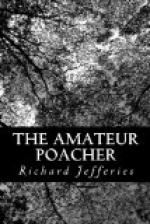There was such a space worn by the attrition of feet sprinkled with sand before the extensive burrow at the top of the meadow where I shot the woodpigeon. These marks suggested to us that we should attempt some more wholesale system of capture than shooting. It was not for the mere desire of destruction, but for a special purpose, that we turned our attention to wiring. The punt, though much beloved, was, like all punts, a very bad sailer. A boat with a keel that could tack, and so work into the wind’s eye, was our ambition.
The blacksmith Ikey readily purchased every rabbit we obtained at sixpence each. Rabbits were not so dear then as now; but of course he made a large profit even then. The same rabbits at present would be worth fifteen or eighteen pence. Every sixpence was carefully saved, but it was clear that a long time must elapse before the goal was attained. The blacksmith started the idea of putting up a ’turnpike’—i.e. a wire—but professed ignorance as to the method of setting it. That was a piece of his cunning—that he might escape responsibility.
The shepherd, too, when obliquely questioned, shook his head, pursed his lips, threw his pitching-bar over his shoulder, and marched off with a mysterious hint that our friend Ikey would some day put his ‘vut in it.’ It did not surprise us that the shepherd should turn his back on anything of the kind; for he was a leading man among the ‘Ranters,’ and frequently exhorted them in his cottage.
The carter’s lad was about at the time, and for the moment we thought of applying to him. He was standing on the threshold of the stable, under the horseshoes and weasles’ feet nailed up to keep the witches away, teasing a bat that he had found under the tiles. But suddenly the dusky thing bit him sharply, and he uttered an oath; while the creature, released, flew aimlessly into the elms. It was better to avoid him.
Indoors, they would have put a very heavy hand upon the notion had they known of it: so we had to rely solely upon the teaching of experiment. In the first attempt, a stick that had been put by for the thatcher, but which he had not yet split, was cut short and sharpened for the plug that prevents the animal carrying away the wire when snared. This is driven into the earth; at the projecting end a notch was cut to hold the string attached to the end of the wire away from the run.
A smaller stick supported the wire above the ground; this latter only just sufficiently thrust into the sward to stand firmly upright. Willow was used for this at first; but it is a feeble wood: it split too much, or bent and gave way instead of holding the wire in its place. The best for the purpose we found were the nut-tree rods that shoot up among the hazel thickets, no larger than the shaft of an arrow, and almost as straight. A slit about half an inch deep was made in the upper end, and in this slit the shank of the wire was sunk. Once or twice the upright was peeled; but this was a mistake, for the white wand was then too conspicuous. The bark should be left on.




